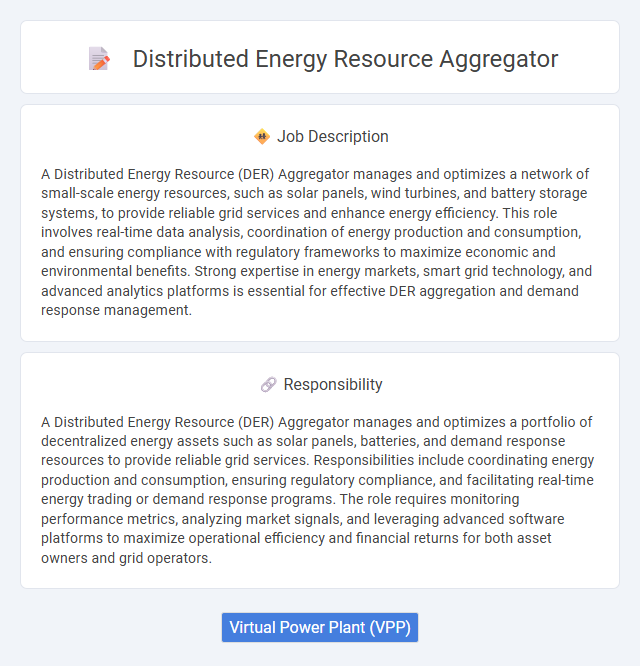
A Distributed Energy Resource (DER) Aggregator manages and optimizes a network of small-scale energy resources, such as solar panels, wind turbines, and battery storage systems, to provide reliable grid services and enhance energy efficiency. This role involves real-time data analysis, coordination of energy production and consumption, and ensuring compliance with regulatory frameworks to maximize economic and environmental benefits. Strong expertise in energy markets, smart grid technology, and advanced analytics platforms is essential for effective DER aggregation and demand response management.
Individuals with strong analytical skills and a background in energy systems are likely to thrive as Distributed Energy Resource (DER) aggregators. Those comfortable with technology, data interpretation, and regulatory environments might find this role suitable. People who adapt well to fast-paced, evolving energy markets probably have a higher chance of success in this job.
Qualification
A Distributed Energy Resource (DER) Aggregator requires a strong background in electrical engineering, energy systems, or a related technical field, often supported by a bachelor's or master's degree. Proficiency in grid management, demand response programs, and energy market operations is essential, along with experience in software platforms for DER integration and real-time data analysis. Certifications such as Certified Energy Manager (CEM) or Professional Engineer (PE) can enhance credibility and demonstrate expertise in managing diverse energy resources within smart grid environments.
Responsibility
A Distributed Energy Resource (DER) Aggregator manages and optimizes a portfolio of decentralized energy assets such as solar panels, batteries, and demand response resources to provide reliable grid services. Responsibilities include coordinating energy production and consumption, ensuring regulatory compliance, and facilitating real-time energy trading or demand response programs. The role requires monitoring performance metrics, analyzing market signals, and leveraging advanced software platforms to maximize operational efficiency and financial returns for both asset owners and grid operators.
Benefit
A Distributed Energy Resource (DER) aggregator likely enhances grid stability by managing diverse energy sources efficiently, reducing dependence on traditional power plants. This role probably lowers energy costs through optimized resource utilization and demand response strategies. Employers may benefit from improved sustainability goals and compliance with evolving energy regulations by employing DER aggregators.
Challenge
Managing a Distributed Energy Resource (DER) aggregator job likely involves addressing the complexity of coordinating multiple small-scale energy resources to maintain grid stability. The unpredictable nature of renewable energy sources and fluctuating demand patterns probably pose significant challenges in real-time optimization and forecasting. Ensuring seamless communication between diverse DER assets and the central system might also be a persistent obstacle to overcome.
Career Advancement
A Distributed Energy Resource (DER) Aggregator career offers significant advancement opportunities in the renewable energy sector by managing and optimizing decentralized energy resources such as solar panels, battery storage, and electric vehicles. Professionals in this role can progress to senior energy management positions, strategic planner roles, or specialized consultancy jobs focusing on grid integration and energy market participation. Expertise in energy systems, data analytics, and regulatory compliance enhances career growth and opens pathways to leadership in innovative energy solutions.
Key Terms
Virtual Power Plant (VPP)
A Distributed Energy Resource (DER) aggregator manages and coordinates multiple small-scale energy resources such as solar panels, batteries, and demand response assets to function as a single Virtual Power Plant (VPP). By optimizing the aggregation of these resources, the aggregator enhances grid reliability, maximizes energy efficiency, and provides crucial ancillary services like frequency regulation and peak load shaving. Utilizing advanced energy management systems and real-time data analytics, DER aggregators enable seamless integration of renewable energy sources into the existing power grid.
 kuljobs.com
kuljobs.com